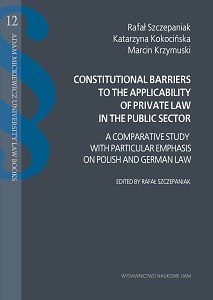Constitutional Barriers to the Applicability of Private Law in the Public Sector. A Comparative Study with Particular Emphasis on Polish and German Law
Constitutional Barriers to the Applicability of Private Law in the Public Sector. A Comparative Study with Particular Emphasis on Polish and German Law
Author(s): Rafał Szczepaniak, Katarzyna Kokocińska, Marcin Krzymuski
Contributor(s): Rafał Szczepaniak (Editor)
Subject(s): Law, Constitution, Jurisprudence, Constitutional Law, Civil Law, Law on Economics, Comparative Law
Published by: Wydawnictwo Naukowe Uniwersytetu Adama Mickiewicza
Keywords: Law; Private (Civil) Law; Constitutional Law; Public Law; Administrative Law
Summary/Abstract: The underlying assumption of this book is that in the special environment that is the public sector, certain features of what we call civil law manifest themselves with particular force through contrast. An analysis of the application of civil law in the public sector is somewhat akin to an intellectual journey to the source of the Amazon. If one seeks a new, fresher view on civil law institutions and the civil law method of regulation, then this possible precisely through observing how they are applied in this particular environment. Observation of the application of the institutions of civil law provenance in the public sector actually prompts one to conduct a detailed analysis, which can be described as a kind of anatomy of civil law. It involves analyzing individual civil law institutions and arrangements, discovering their nature and the fundamental elements they consist of, as well as identifying the axiological and praxeological foundations that contributed to their development. The analysis carried out in the monograph indicates multiple relationships between civil law and constitutional law. The authors hope that this monograph will contribute to clarifying the relationship between these two branches of law. In this monograph, the authors raise the question whether, in the light of the provisions of the current Constitution, there are barriers standing in the way of using private law in the public sector. The authors respond in the affirmative to the question formulated in this way. In their opinion, due to the specific nature of the State and other public entities, some of the institutions of civil law lose their raison d'être in the public sector, and the nature of others undergoes change to a lesser or greater extent. This phenomenon can be observed, for example, in the sphere of exercising subjective rights by public entities, in the sphere of their tort liability, in their legal capacity and freedom of contract, as well as in relation to such institutions of law as unjust enrichment. The legislator and the public bodies applying these laws, in particular the courts, should take this phenomenon into account. Otherwise, there may be violations of the standards of the democratic state of law, including the constitutional rights and freedoms of citizens. In conclusion, the authors consider the need for developing a sub-branch of civil law which would find its application in the public sector.
- E-ISBN-13: 978-83-232-3639-9
- Print-ISBN-13: 978-83-232-3638-2
- Page Count: 702
- Publication Year: 2020
- Language: English
- eBook-PDF
- Table of Content
- Introduction

